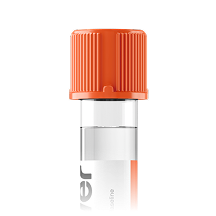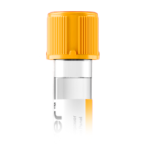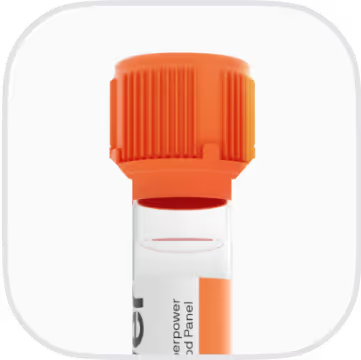Key Benefits
- Spot rheumatoid arthritis early, sometimes before symptoms, by detecting anti‑CCP antibodies.
- Clarify unexplained joint pain and morning stiffness by flagging autoimmune joint inflammation.
- Predict higher risk of erosive joint damage to guide earlier, stronger treatment.
- Differentiate rheumatoid arthritis from osteoarthritis, gout, or viral arthritis when symptoms overlap.
- Guide timely rheumatology referral and early, goal‑directed care if positive.
- Flag higher risk of nodules or lung involvement in CCP‑positive rheumatoid arthritis.
- Interpret results most appropriate with rheumatoid factor, inflammatory markers, imaging, and your symptoms.
- Know that a negative result does not exclude rheumatoid arthritis, especially early.
What is a CCP antibody blood test?
CCP antibody blood testing looks for antibodies your immune system makes against small protein fragments called cyclic citrullinated peptides. These peptides appear when an enzyme changes one protein building block (arginine) into citrulline during inflammation (citrullination by peptidylarginine deiminase, PAD). In some people, B cells misread these altered proteins as threats and produce autoantibodies against them (anti-CCP). The test measures these autoantibodies in a blood sample.
Anti-CCP antibodies signal a loss of immune tolerance to citrullinated proteins, especially in joint tissues. By binding to these targets in the synovial lining, they help drive and sustain inflammation through immune-cell recruitment and related pathways (adaptive autoimmune response, immune complexes, complement). Because this pattern is tightly linked to rheumatoid arthritis, anti-CCP reflects the specific autoimmune process that underlies persistent, erosive joint inflammation. These antibodies can appear before noticeable symptoms, indicating an early immune shift toward attacking citrullinated proteins and helping distinguish this biology from other causes of joint pain.
Why is a CCP antibody blood test important?
CCP (cyclic citrullinated peptide) antibodies are immune proteins directed against the body’s own citrullinated proteins. Their presence signals a loss of immune tolerance that most often targets joints, driving synovial inflammation and, over time, cartilage and bone damage. Because this process is systemic, CCP positivity also links to fatigue, cardiovascular strain from chronic inflammation, and, in some people, lung and eye involvement.
Most labs report this test as negative or as weak, moderate, or strong positive. The healthiest range is negative (undetectable). Higher values correlate with higher likelihood of rheumatoid arthritis (RA) and a greater risk of erosive disease.
When the value is negative or very low, it usually means no detectable autoimmune response against citrullinated proteins. That lowers the probability of RA, but does not eliminate it—early disease and “seronegative” RA can still cause joint pain, morning stiffness, or swelling. In children, CCP is often negative even with juvenile arthritis, and during pregnancy autoantibodies may transiently decrease.
When the value is high, the immune system is actively recognizing citrullinated proteins. In joints, this fuels synovitis, cytokine release, and osteoclast activation, leading to tender, stiff, swollen small joints and progressive erosion. Extra-articular features can include nodules, dry eyes/mouth, anemia of inflammation, and, in some, interstitial lung disease. Women develop RA more often, but a high CCP level predicts similar risk and severity in all sexes; in youth, positivity suggests a more erosive course.
Big picture: CCP antibodies anchor RA diagnosis alongside rheumatoid factor, ESR/CRP, and imaging. They connect joint biology to whole-body inflammation and long-term risks such as disability and cardiovascular disease.
What insights will I get?
A CCP antibody blood test measures autoantibodies directed against cyclic citrullinated peptides. These antibodies mark a loss of immune tolerance to citrullinated proteins and signal a tendency toward autoimmune joint inflammation. At a systems level, positivity tracks with chronic inflammatory signaling that can affect energy, muscle and bone turnover, and cardiovascular risk.
Low values usually reflect minimal or undetectable autoantibody production, indicating preserved immune tolerance. This aligns with lower systemic inflammatory load. In people with joint symptoms, however, low or negative results do not exclude rheumatoid arthritis (seronegative disease can occur), especially early on or when immune responses are blunted by pregnancy or immunosuppressive therapy.
Being in range suggests the immune system is not targeting citrullinated proteins and that inflammatory pressure on joints, bone, and vasculature is low. For CCP, “within reference ranges” typically sits at the low end of the reference interval (often negative) rather than mid‑range.
High values usually reflect active autoreactive B‑cell responses to citrullinated antigens, increasing the likelihood of rheumatoid arthritis and, when sustained, a greater risk of persistent synovitis, erosive joint damage, and extra‑articular involvement (such as interstitial lung disease). Systemically, this pattern often accompanies cytokine‑driven fatigue, anemia of inflammation, and accelerated bone resorption. Levels can rise years before symptoms and are more frequent in smokers; they may appear in other autoimmune or chronic lung conditions, typically at lower titers.
Notes: Assay generations (e.g., CCP2 vs CCP3) and lab cutoffs differ, and results may be reported qualitatively or quantitatively. Rheumatoid factor is complementary but less specific. Early disease can be antibody‑negative. Pregnancy and immunomodulatory drugs can lower titers without eliminating risk. Age and intercurrent infections seldom cause false positives compared with other autoantibodies.


.svg)









.avif)



.svg)





.svg)


.svg)


.svg)

.avif)
.svg)










.avif)
.avif)



.avif)







.png)

.avif)


